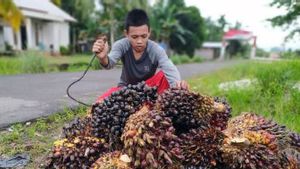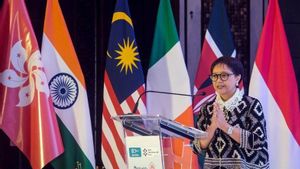JAKARTA - The results of a study conducted by NGOs in the international environment 350.org and CelIOS show that community-based renewable energy was able to create a contribution to GDP (Gross Domestic Product) of IDR 10,529 trillion for 25 years.
According to EXECUTIVE Economist and Executive Director of BELIOS, Bhima Yudhistira, the positive impacts produced are in line with efforts to encourage higher quality economic growth.
"Positive impact of community-based renewable energy is also able to reduce poverty to more than 16 million people. From the employment side, there is an opportunity for work of 96 million people in various sectors not limited to energy, but the manufacturing and trade industries are also brought up", Bhima said in a written statement, Tuesday, May 21.
Bhima said that when the government was looking for a way to reduce the unemployment rate in the regions, community-based energy development was one solution.
According to Bhima, community-based renewable energy funding opportunities can come from the commitment of JETP (Just Energy Transition Partnership). if 50 percent of JETP funds amounting to 20 billion US dollars are allocated to develop community-scale renewable energy, it can generate a capacity of 2.18 GW.
"That means that renewable energy plants are at least able to replace 3.3 units of PLTU equivalent to Cirebon-1 which has a capacity of 660 MW", said Bhima.
Bhima conveyed that this study could open the eyes of policy makers in the country to immediately shift energy transition policies that have only focused on large-scale power plants that are actually vulnerable to causing social and environmental impacts for local communities.
"On the other hand, community-based renewable energy development is actually able to have an impact on decreasing inequality between regions during the 20 years of implementation from 0.74 to 0.71. Because its nature is more inclusive, community-based energy is very suitable to be applied in Indonesia," he said
Meanwhile, the interim Indonesia team lead 350.org Firdaus Cahyadi revealed that so far the energy transition policy in Indonesia has been dominated by a single narrative that is biased on the development of large-scale renewable energy.
"The single narrative was felt in the JETP CIPP (Comprehensive Investment and Policy Plan) document which was launched last November 2023," he said.
SEE ALSO:
Firdaus conveyed that the single narrative cannot be separated from the dominance of international aid business institutions such as GFANZ (Glasgow Financial Alliance for Net Zero), ADB and World Bank.
"Large-scale renewable energy development is a way to create foreign debt traps within the JETP funding scheme," he said.
Firdaus explained that aid business institutions are always present in every working group in JETP.
Furthermore, Firdaus said that this study was part of an effort to fight the dominance of the single narrative of international aid business institutions.
"The single narrative of international aid business institutions must be fought, if we want to realize a just energy transition in JETP," he concluded.
The English, Chinese, Japanese, Arabic, and French versions are automatically generated by the AI. So there may still be inaccuracies in translating, please always see Indonesian as our main language. (system supported by DigitalSiber.id)
















